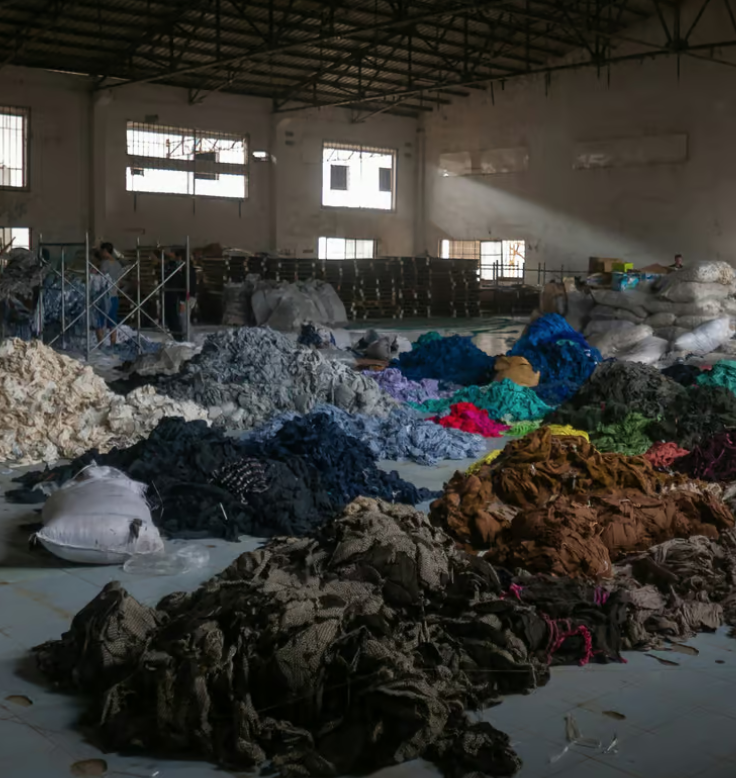
The nets, which once teemed with fish, are now entangled in tonnes of textile waste dumped into the Atlantic from the nearby Kantamanto market, one of the world’s largest second-hand markets.
With all these clothes “our nets are getting damaged, the fish are moving away and so are our livelihoods”, explains Nii Armah to AFP.
In the heart of Accra’s business district, the Kantamanto market extends over more than 20 hectares with aisles of lively, colourful stalls overflowing with all kinds of second-hand clothes sold for a modest sum.
Used clothes, bags and shoes are collected in rich countries before being imported into Ghana.
Some 15 million bales arrive on this market every week, according to the Ghanaian environmental organisation OR Foundation.
But around 40%, too damaged to be sold, are dumped in open-air landfill sites, often ending up in the ocean, according to the NGO.
“Environmental crisis
In 2021 Ghana became the world’s largest importer of second-hand clothes, according to the Observatory of Economic Complexity (OEC).
Every month, USD 214 million worth of clothing is shipped to this West African country, mainly from the UK, Canada and China.
It is estimated that up to 30,000 jobs have been created by this activity.
But this comes at the cost of an increasingly alarming “environmental and social” crisis, NGOs are denouncing.
Over the last two decades, the rise of “fast fashion” – the rapid renewal of collections at lower cost – has increased the quantity of clothing, which is of poor quality and unusable at the end.
“This overproduction leads to over-consumption and feeds the disposable culture, while many African countries lack the infrastructure needed to process waste”, wrote Greenpeace in an article published in November.
In fact, in Accra, clothes “are mostly thrown away indiscriminately because our way of dealing with waste is not efficient”, Justice Adoboe of the Ghana Water and Sanitation Journalists Network told AFP.
“When it rains, the water carries away the old clothes and dumps them down the drains, they end up in our waterways and ravage aquatic life.”
The local council, the Accra Metropolitan Assembly, spends around USD 500,000 a year collecting and disposing of unusable items from the Kantamanto market.
But it can only process around 70% of this waste; the rest is either burnt nearby, leading to air pollution, or dumped in fragile ecosystems, according to the OR Foundation.
The situation was further exacerbated when the Kpone landfill, the country’s only official one, caught fire in 2019 after being overwhelmed with second-hand clothes.
The tentacles of the ocean
On some parts of Accra’s beaches, the sand is no longer even visible, covered by mounds of used textiles and plastics several metres high in places.
Over the course of a year, OR Foundation experts counted 2,344 textile “tentacles” – tangled masses of thousands of items of clothing, sometimes dozens of metres long, along a seven-kilometre stretch of coastline.
To date, no solution has been found, while at the same time this deluge of textile waste is accompanied by “significant growth” in the industry, as Ganyo Kwabla Malik, Director of the Accra composting and recycling plant, points out.
In 1994, the Ghanaian government banned the import and sale of used underwear for hygiene reasons. But the law has never been enforced.
The Accra municipal authorities estimate that building a new landfill site would cost around USD 250 million, not including the cost of compensating for the environmental damage already caused.
Meanwhile, for fisherman Nii Armah, the situation is urgent. “We are begging the authorities to do something”, he says (AFP).
Read more – Fashion United
Also worth noting: on Saturday in @laterreaucarre @franceinter, France Inter will be devoting a Grand Format report to the Kantamanto market in Ghana,
